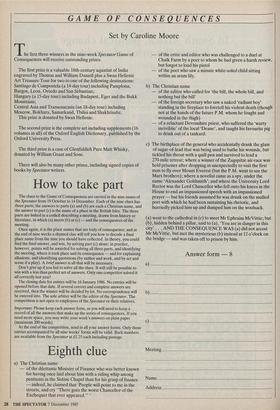GAME OF CONSEQUENCES Set by Caroline Moore
The first three winners in the nine-week Spectator Game of Consequences will receive outstanding prizes.
The first prize is a valuable 18th-century aquatint of India engraved by Thomas and William Daniell plus a Swan Hellenic Art Treasure Tour for two to one of the following destinations: Santiago de Compostela (a 14-day tour) including Pamplona, Burgos, Leon, Oviedo and San Sebastian; Hungary (a 15-day tour) including Budapest, Eger and the Bukk Mountains; Central Asia and Transcaucasia (an 18-day tour) including Moscow, Bokhara, Samarkand, Tbilisi and Shakhrisabz. This prize is donated by Swan Hellenic.
The second prize is the complete set including supplements (16 volumes in all) of the Oxford English Dictionary, published by the Oxford University Press.
The third prize is a case of Glenfiddich Pure Malt Whisky, donated by William Grant and Sons.
There will also be many other prizes, including signed copies of books by Spectator writers.
How to take part
The clues to the Game of Consequences are carried in the nine issues of the Spectator from 19 October to 14 December. Each of the nine clues has three parts; the answers to parts (a) and (b) are each a Christian name, and the answer to part (c) is the name of a place in the British Isles. The three parts are linked in a codicil describing a meeting, drawn from history or literature, in which (a) meets (b) at (c) — and the consequences of the meeting.
Once again, it is the place names that are truly of consequence; and at the end of nine weeks a rhymed clue will tell you how to decode a final place name from the nine you should have collected. In theory, you could find the final answer, and win, by solving part (c) alone; in practice, however, points will be awarded for solving all three parts, and identifying the meeting, where it took place and its consequence — and for explaining allusions, and identifying quotations (by author and work, and by act and scene if a play). A brief answer is all that will be necessary.
Don't give up if you fail to solve all the clues. It will still be possible to win with a less than perfect set of answers. Only one competitor solved it all correctly last year!
The closing date for entries will be 16 January 1986. No entries will be opened before that date. If several correct and complete answers are received, then the winner will be decided by lot. No correspondence will be entered into. The sole arbiter will be the editor of the Spectator. The competition is not open to employees of the Spectator or their relatives.
Important: Please keep each answer form, as you will need to keep a record of all the answers that make up the series of consequences. If you need more space, you may write your week's answers on plain paper (maximum 200 words).
At the end of the competition, send in all your answer forms. Only those entries accompanied by all nine weeks' forms will he valid. Back numbers are available from the Spectator at £1.25 each including postage.
Eighth clue
a) The Christian name — of the dilettante Minister of Finance who was better known for having once laid about him with a riding whip among penitents in the Sistine Chapel than for his grasp of finance — indeed, he claimed that 'People will point to me in the streets, and cry "There goes the worst Chancellor of the Exchequer that ever appeared." ' — of the critic and editor who was challenged to a duel at Chalk Farm by a poet to whom he had given a harsh review, but forgot to load his pistol — of the poet who saw a minute white-soled child sitting within an arum lily.
b) The Christian name of the editor who called for 'the bill, the whole bill, and nothing but the bill' of the foreign secretary who saw a naked 'radiant boy' standing in the fireplace to foretell his violent death (though not at the hands of the future P.M. whom he fought and wounded in the thigh) — of a reluctant Devonshire priest, who suffered the 'warty incivilitie' of the local 'Deane', and taught his favourite pig to drink out of a tankard.
c) The birthplace of the general who accidentally drank the glass of sugar-of-lead that was being used to bathe his wounds, but tickled his throat with a quill pen and survived to lead a 270-mile retreat; where a winner of the Zugspitze air-race was held prisoner after dropping in unexpectedly to visit the first man to fly over Mount Everest (but the P.M. went to see the Marx brothers); where a novelist came as a spy, under the name 'Alexander Goldsmith'; and where the University Lord Rector was the Lord Chancellor who fell onto his knees in the House to end an impassioned speech with an impassioned prayer — but his friends assumed he was drunk on the mulled port with which he had been sustaining his rhetoric, and hurriedly picked him up and dumped him on the woolsack.
(a) went to the cathedral in (c) to meet Mr Ephraim McVittie; but (h), hidden behind a pillar, said to (a), 'You are in danger in this city' . . AND THE CONSEQUENCE WAS (a) did not accost Mr McVittie, but met the mysterious (b) instead at 12 o'clock on the bridge — and was taken off to prison by him.
Answer form — 8
a) b) c) Meeting Name Address


































































 Previous page
Previous page